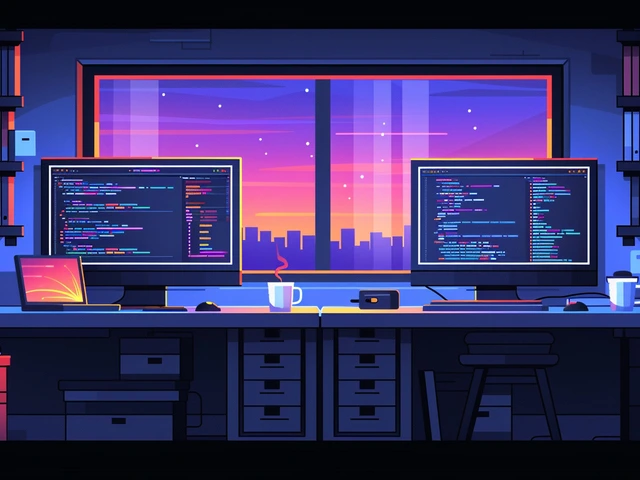Jan
4

- by Miranda Fairchild
- 0 Comments
The Rising Significance of Coding in the Professional Sphere
Isn't it fascinating to think that just a few decades ago, coding was considered a niche skill reserved for the few who dared to navigate those mystifying seas of letters, numbers, and symbols? However, like the fashion evolution from bell-bottoms to skinny jeans, coding is now not just 'in vogue' but a critical career skill across a plethora of industries. It doesn't matter if you're a marketing maestro, a healthcare hero, or even if you’re just starting to dip your toes into the professional pool—all roads seem to be leading to Codeville.
Let's chat about how coding became the new black in terms of must-have skills for job seekers. This skyrocketing demand for coding proficiency is something like the gold rush for professionals. I remember a conversation with my spouse, Benjamin, about how even job roles traditionally considered far from coding – say, a content writer – now sometimes require at least a rudimentary understanding of HTML or CSS. It's becoming clear that throwing some coding skills into your career mix can give you the kind of snazz that might just get you that dream job!
I mean, let's be real here, having coding skills on your resume could very well be the equivalent of having a secret professional superpower. Picture this: you're in a meeting, and someone yells, "Is there a coder in the room?" You casually raise your hand, and voilà, you're the superhero of the hour—and all because you took the time to learn some Python, Java, or whatever language tickles your fancy. Understanding the language of computers has become remarkably similar to having an additional language in one's linguistic arsenal. Except, you're conversing with machines, which, let's be honest, can be a lot more predictable than humans at times.
The Marriage of Coding and Soft Skills: A Love Story for the Modern Job Market
When we think of coding, most of us might conjure images of folks hunched over keyboards churning out lines of mystical incantations that magically bring apps and websites to life. But coding isn't just about technical finesse—it's equally about problem-solving, creativity, and communication. If I were to put on my matchmaking hat, I'd argue that coding and soft skills are practically soulmates in today’s job market. We're talking about a 'meet-cute' between logical algorithms and the art of human interaction.
It's hilarious when I recall my early attempts to learn coding—I was so focused on getting the syntax right that I completely overlooked how coding was enhancing my problem-solving skills. Each bug became a riddle, each project a labyrinth of logic. And goodness, did it improve my patience! Every time my code would finally work as intended, I could feel those neural pathways in my brain celebrating like they'd won the Super Bowl. If there's one thing I've learned, it's that when soft skills meet hard skills, it’s a match made in employment heaven.
This union becomes particularly powerful during job interviews. Imagine confidently explaining to a prospective employer how you used your coding expertise to streamline a process or resolve an issue. It’s not just about the cold, hard technical skills, but also about your leadership, teamwork, and innovative thinking that can transform tech know-how into gold dust. Plus, the ability to translate tech-speak into plain English is a superpower in its own right. I've seen Benjamin’s eyes glaze over when I get into the nitty-gritty of a coding problem—I assure you, keeping the tech talk accessible is a skill that deserves its own Oscar.
How Learning to Code Alters Career Trajectories
I’m always amazed when I hear about the transformative power of coding on career paths. It’s like that plot twist in a movie you never saw coming but realize it was foreshadowed all along. Coding can be that one skill set that pivots a career direction toward success. For some, learning coding is like discovering a secret passage in a video game that opens up a whole new world of professional opportunities. It's kind of like leveling up in real life!
I've got a friend – let’s call him Lucas – who began his journey in graphic design. A pad and a pen were his weapons of choice until one day, he decided to arm himself with HTML and CSS skills. Suddenly, he went from a traditional designer to a user experience warrior, taking his career to a whole other dimension. Think of coding as the Mario mushroom in your professional game—it makes you bigger and gives you an edge to smash those career blocks.
Learning to code doesn’t mean you need to aspire to become the next Steve Jobs or Mark Zuckerberg—though, hey, if that's your dream, who am I to stop you? It’s about adding a strategic skill that aligns with innovation, efficiency, and tech-savviness that employers are salivating for these days. Let me tell you, the difference between a resume with and without coding skills can sometimes be like the difference between day-old bread and fresh-from-the-oven loaves—everyone prefers the latter. And it's not just about getting a job; it's about creating a springboard for growth within your role, too.
Navigating the Sea of Coding Languages: Which to Learn?
Embarking on a coding learning journey can feel like setting sail in uncharted waters. Which language do you learn? Is it Java, JavaScript, or are they somehow related (spoiler: they are as related as sharks and dolphins—not much)? It's like walking into an ice cream shop and seeing a gazillion flavors; making a choice can be paralyzing. But fear not! I’m here with my trusty compass to help you navigate these waters.
To pick the right coding language, you need to consider where you want your career ship to land. Fancy being a web developer? Then HTML, CSS, and JavaScript should be your starting trinity. Maybe you're drawn to the world of app development – then, it might be Swift for iOS magic or Kotlin for Android wizardry. It’s also essential to keep in mind the ever-changing tech tides; today’s hot coding language may be tomorrow’s cold leftovers.
And let's not forget about the trendy kids on the block – I'm looking at you, Python and Ruby. Python, in particular, seems to have secured its invite to every coding party thanks to its versatility and readability. It's like the little black dress of coding: timeless, classic, and appropriate for nearly every occasion. Whatever your choice may be, it’s less about the 'what' and more about the 'why.' The journey isn't just about memorizing code; it's about understanding the logic behind it and how it applies to solving real-world problems. As my dear Benjamin often says when I obsess over which new hobby to pick up, "The best choice is the one you’ll stick with long enough to see results."
Why Every Industry Wants a Piece of the Coding Pie
Coding has infiltrated nearly every industry you can think of. It's like kudzu—growing rapidly and virtually impossible to contain. Being tech-literate with at least some coding knowledge is becoming a requirement in fields you wouldn't expect. From finance forecasting with complex algorithms to digital content creation in media, coding is everywhere. It's the secret sauce that's spicing up job roles across the board.
Let's talk healthcare, where coding is integral for data analysis and developing patient management systems. Or agriculture, where precision farming software has revolutionized the way we grow food—talk about farm to table, right? And, of course, there's the realm of education, which has seen an enormous shift toward online learning platforms. Coding is the key that’s unlocking innovation everywhere, which is why Benjamin sometimes jokes that I wield a magic wand when I'm debugging code.
It’s not just the private sector that's head over heels for coding skills. Governments are now emphasizing the importance of digital literacy, which includes coding in their workforce. They recognize that the digital economy isn't just a slice of the pie; it's the whole darn bakery. Think about the last time you interacted with any digital service—from online shopping to booking a doctor’s appointment. I bet there’s a fair amount of coding sorcery working its wonders behind the scenes. So, no matter where your career journey may take you, understanding the digital thread that connects all these industries is a smashing idea.
The Remote Work Revolution and Coding
Remember when 'WFH' was just a jumble of letters? Well, since the recent global shakeup (yeah, you know the one), these three letters have become synonymous with a new way of working. The remote work revolution has taken the world by storm, and spoiler alert—coding has a first-class ticket on this ride. With a laptop and a stable internet connection, coders can conquer their work from almost any corner of the globe.
This miraculous flexibility is why I often joke that my home office is my personal space capsule—I can connect with colleagues across different time zones as if I’m operating a command center on the ISS. Coding, in a sense, has become a universal language. You could collaborate with a team where one person is sipping tea in London, another's enjoying a sunset in Bali, and you’re cozied up with your pup on the couch. The remote work trend is like a buffet, and coding skills are the VIP pass that gets you unlimited access.
Beyond the personal convenience, the remote work trend has also revealed the importance of cybersecurity, digital infrastructure, and cloud services. Companies are hunting for tech-savvy individuals who can navigate these areas—enter the coding experts. Benjamin often hear me say, “The internet is my office” and that’s because, in essence, the languages I’ve learned to speak through code have enabled me to work, create, and collaborate in ways that were once the stuff of science fiction. This is indicative of how learning to code opens up a world (literally) of possibilities.
Learning Resources and Tips for Aspiring Coders
If you’re chomping at the bit to get started on your coding journey, I’ve got your back with some good news: the resource buffet is open 24/7 and it's all-you-can-learn. From free online tutorials to full-blown coding bootcamps, there’s something to suit every learning style and budget. And get this, you don't even need to spend a small fortune or commit to a four-year degree to get your coding stripes. The digital learning arena is a treasure trove just waiting to be explored.
Resources like Codecademy, freeCodeCamp, and even YouTube have a wealth of tutorials to get you started. And if you’re looking for more structured learning, many universities offer coding courses online. But let's not sugarcoat it—this isn't like learning to make toast. It requires dedication, a sprinkle of frustration, and a whole lot of "Ah-ha!" moments. I often tell Benjamin that learning to code is like working out; you might not see the results immediately, but every session makes you stronger.
My top tip? Start with a project-based approach. It’s infinitely more engaging to apply what you’re learning to a real-world project. Maybe you want to build a personal blog from scratch or develop a simple app to solve a daily annoyance. Nothing beats the feeling of seeing your code come to life. Grind through the tough bits, celebrate the small wins, and don’t forget to join a community. Online forums or local meetups can be incredible sources of support and knowledge-sharing.
Demystifying the Coding Job Market: What Employers Really Want
Understanding what employers are looking for in coding-literate job candidates is like decoding a secret message to find a treasure. Spoiler: It’s not enough to just know how to code; you've got to show that you can think like a coder, too. Employers are keeping an eye out for professionals who can demonstrate critical thinking, collaborate with cross-functional teams, and continuously learn and adapt – the proverbial triple threat of the coding world.
During job interviews, it’s not just about having coded a little something; it’s about the problem-solving process you went through, the logic behind your decisions, and how your work fits into the bigger business picture. This is where storytelling comes into play. Describing the workflow, challenges, and outcomes of your coding projects is like weaving a spellbinding tale that can captivate potential employers. And let me tell you, they are ready to be spellbound. Throw in some teamwork anecdotes, and you’ve practically written the script for a hit career blockbuster.
One aspect I’ve learned (and relearned) is the importance of adaptability. The tech world is akin to a shapeshifter, constantly evolving and surprising us with new trends. Employers are on the hunt for the kind of people who are as comfortable with change as they are with their morning coffee. It’s almost like they want modern-day techno-nomads, ready to traverse the digital landscape with ease and confidence. And remember, every job interview is also an opportunity to interview the company—a coding romantic comedy, if you will, where both parties are seeking 'The One.'
Embracing the Future: Why Coding is Here to Stay
The crystal ball verdict is in, and it’s clear: coding isn’t just a fleeting trend, it’s an enduring change in the fabric of the job market. We're not just talking about a skill that's 'nice to have'; we’re talking about a fundamental shift in how we interact with technology in our lives and careers. In this digital age, those who can converse with machines are akin to wizards—shaping the digital world we all inhabit.
Coding has become a cornerstone of innovation. Whether it's revolutionizing traditional fields, creating entirely new industries, or simply making existing processes more efficient, coding is the common denominator. The exciting part? Everyone has a seat at the table. Kids are learning to code in school, adults are transitioning careers through coding bootcamps, and even retirees are picking up coding to keep their minds sharp.
As we continue to hurtle into an increasingly digital future, coding remains a key player. It’s like the glue holding together the various pieces of our tech-centric existence. And as Benjamin enjoys reminding me, if you're ever feeling insignificant in the grand scheme of things, just remember: with the power of code, you can literally create something out of nothing. How magical is that?
To sum it up, coding is not just impacting today's job market; it’s revolutionizing it. By learning to code, you’re not just investing in your career; you’re embracing a future that's becoming more connected, automated, and digitized every day. Whether you're drawn to the challenge, excitement, or the sheer practicality of it all, coding is a journey with a destination that's as boundless as your imagination. So, here’s to coding—the secret superpower that might just change your world. And if you're still on the fence about whether to jump into coding, I say: leap! After all, the best way to predict your future is to code it.






Write a comment